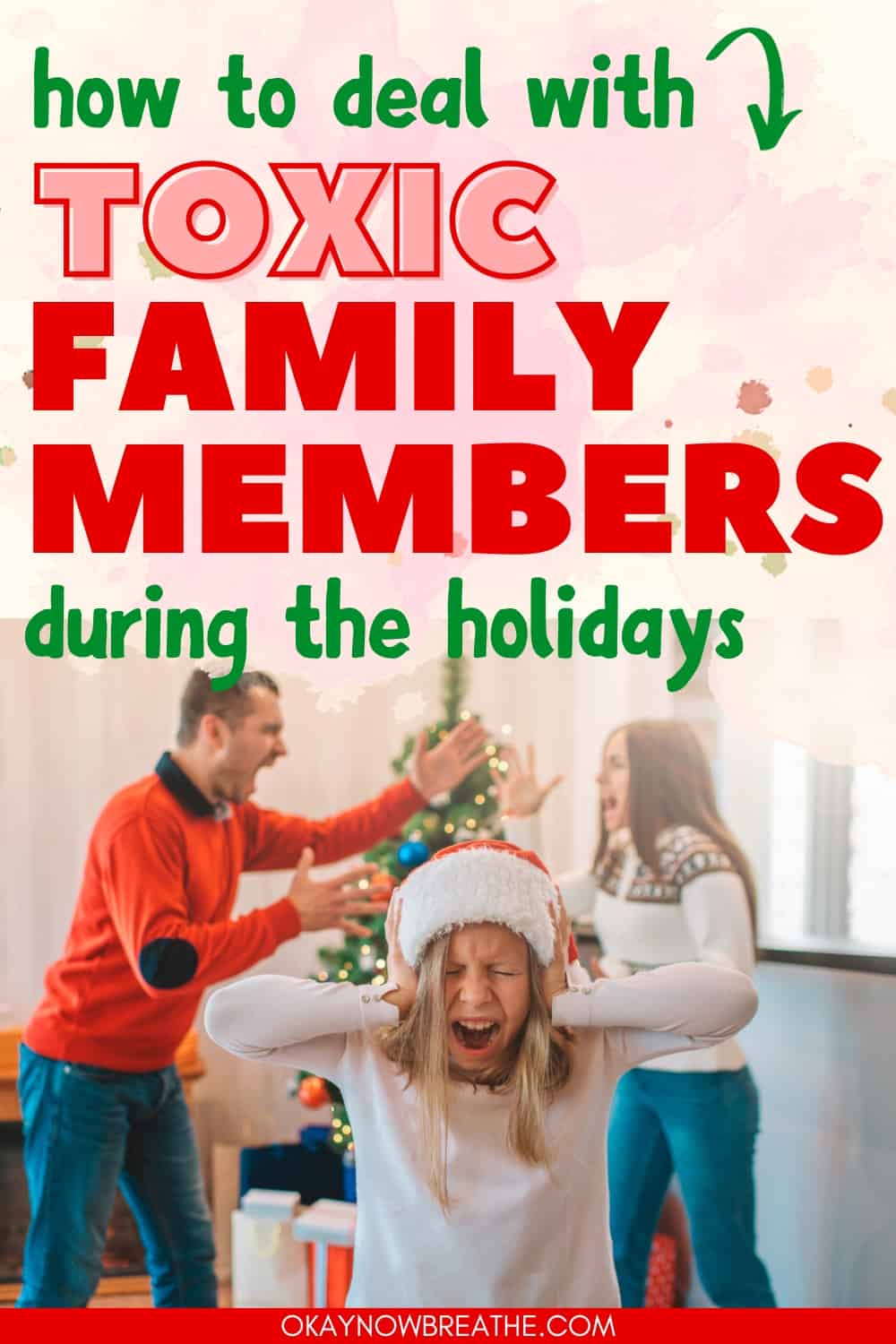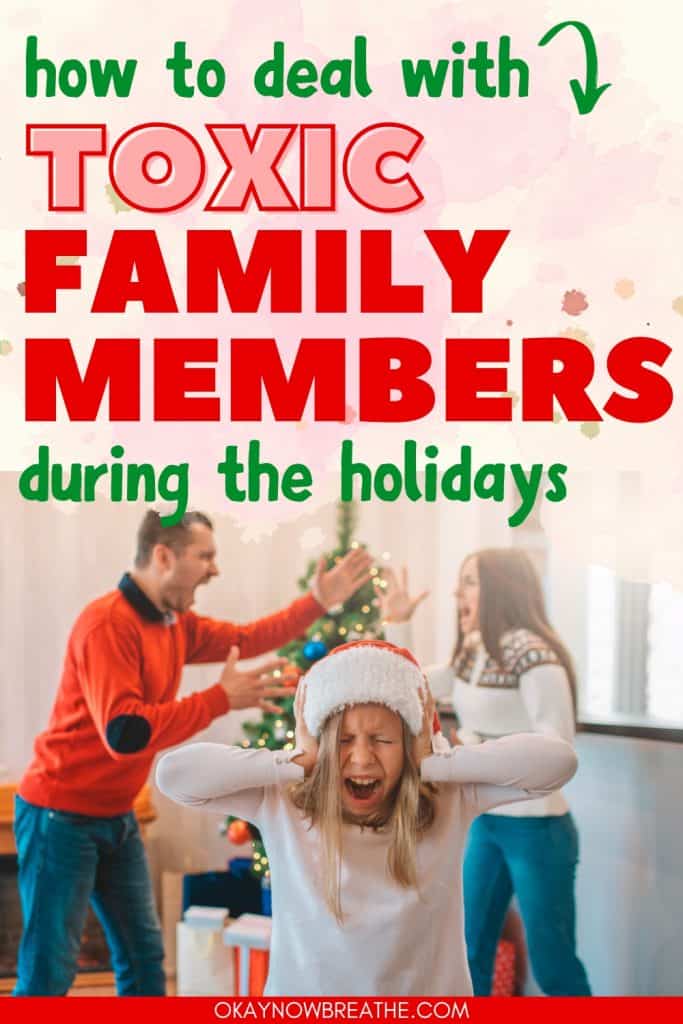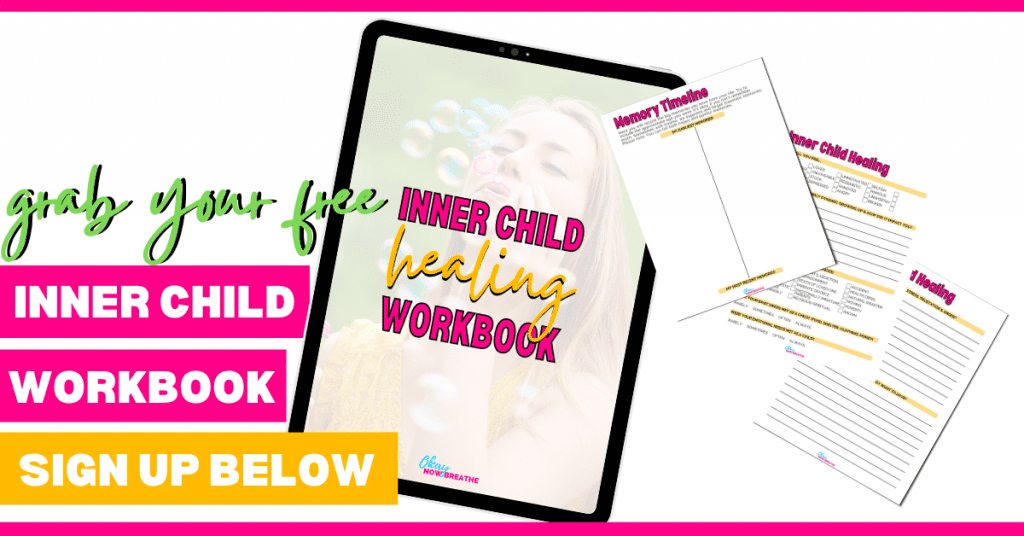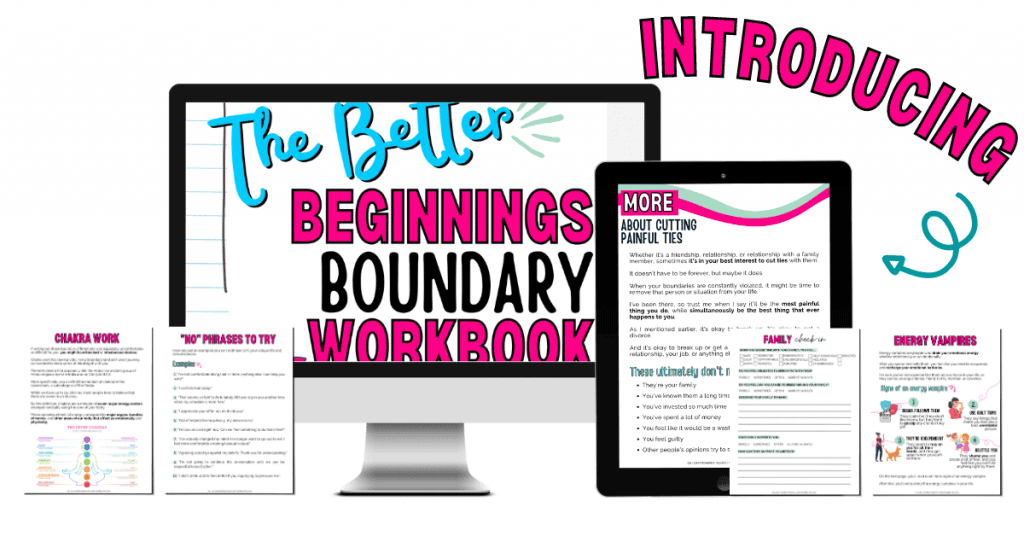
DISCLOSURE: I am not a mental health professional. If you need help finding a mental health care provider, call 1-800-662-HELP (4357) or visit Online Therapy to call, message, or video chat a certified therapist online. This post contains affiliate links. As an Amazon Associate, I earn from qualifying purchases. I may also receive compensation from Online Therapy or other sources if you purchase products or services through the links provided on this page. You can read my full disclaimer.
The holidays can be filled with warm cozy vibes and delicious food, but it can also mean you have to learn how to deal with your toxic family.
You might feel obligated to spend time with them, and the thought of doing so might make you want to throw up from all the stress and anxiety.
You’re definitely not alone in this struggle, and many people face similar challenges during the holiday season.
How to Deal with Toxic Family During the Holidays: Tips and Strategies
1. UNDERSTAND TOXIC FAMILY DYNAMICS
I’m sure you already know that dealing with toxic family members can be mentally exhausting during the holidays.
Maybe you have an uncle who likes to force his outdated beliefs down your throat.
Or maybe your grandma won’t shut up about when you’re going to get married and finally give her a great-grandbaby.
No matter who’s toxic in your family, dysfunctional family dynamics can make gatherings feel more like a burden than a joy.
Understanding these dynamics can help you prepare for and cope with difficult situations.
What is a dysfunctional family?
A dysfunctional family is when the relationships between family members are strained or broken.
This can be caused by:
✔️ Abuse
✔️ Neglect
✔️ Active addiction
✔️ Untreated mental illness
Dysfunctional families often have poor communication skills, lack of trust, and low self-esteem.
Effects of having a toxic family ⤵️
Dealing with toxic family members can have a significant impact on your mental health and wellbeing.
Toxic family members can manipulate and control those around them, often using guilt, shame, and fear to get what they want.
Some of the effects of toxic family members include:
➡️ Anxiety: Toxic family members can cause you to feel anxious and stressed. You might worry about what they’ll say or do, or how they’ll react to your choices.
➡️ Low self-esteem: Constant criticism and belittling can erode your self-esteem and make you feel unworthy.
➡️ Depression: Dealing with toxic family members can lead to feelings of sadness and hopelessness. You might feel trapped or powerless to change the situation.
➡️ Guilt: You might feel guilty for setting boundaries or standing up for yourself.
More on shame:
👉 18 Signs of Toxic Shame in a Person (That Are Worth Healing)
✨ Speaking of toxic family members, have you downloaded your free inner child healing workbook yet? 👇
2. SET BOUNDARIES WITH TOXIC FAMILY MEMBERS
Setting boundaries and sticking to them is an essential key to protecting yourself from toxic family members.
This means being clear about what you will and will not tolerate and communicating those boundaries to your family members.
For example, if your cousin tends to make hurtful comments, you can let them know that you won’t engage in conversations that involve insults or bullying.
Without boundaries, toxic family members can easily manipulate, control, and cause harm to you.
Benefits of Setting Boundaries ⤵️
⭐ Protects Your Mental Health: By establishing limits on what you will and will not tolerate, you can reduce the amount of stress, anxiety, and depression you experience.
⭐ Improves Your Relationships: Demonstrating clear expectations and guidelines for how you want to be treated can lead to healthier and more respectful interactions.
⭐ Increases Your Self-Esteem: Setting boundaries can increase your self-esteem by empowering you to assert your needs and wants. It can also help you recognize your own worth and value as a person.
Why It’s Necessary ⤵️
⭐ Reduces Stress and Anxiety: Setting boundaries can reduce stress and anxiety by giving you a sense of control over your interactions with toxic family members. It can also help you avoid situations that trigger negative emotions.
⭐ Maintains Your Autonomy: Boundaries allow you to make your own decisions and live according to your own values and beliefs.
⭐ Protects Your Physical Safety: Setting boundaries can protect your physical safety from toxic family members who may be physically abusive or violent. By establishing clear limits on what is acceptable behavior, you can reduce the risk of harm.
If you’re not ready to purchase The Better Beginnings Boundary Workbook yet, here are some tips to help you set boundaries with toxic family members…
🎯 Define your boundaries
The first step in setting boundaries is deciding what is acceptable and unacceptable behavior.
Ask yourself these boundary questions:
➡️ What behaviors, experiences, and conversations make me uncomfortable?
➡️ What are my limits, and how do I know I’ve hit them?
➡️ How do I feel when a family member crosses my boundaries?
Make a list of behaviors that you will not tolerate, such as yelling, argument, or any form of abuse. Identify what triggers you and what your limits are.
Once you’ve identified your boundaries, you’ll be better equipped to communicate them to your toxic family members.
You can assess your boundaries more clearly and efficiently in The Better Beginnings Boundary Workbook.
🎯 Communicate your boundaries effectively
Once you’ve defined your boundaries, it’s time to communicate them effectively.
Use “I” statements to express your feelings and needs.
For example, “I feel uncomfortable when you yell at me, and I need you to stop.”
Try to be assertive but polite, and avoid being defensive or aggressive.
Remember that you are setting boundaries to protect yourself, not to control others.
🎯 Enforce your boundaries
To ensure that your boundaries are respected, be consistent in enforcing them.
You have the right to say no and to protect your own wellbeing.
In fact, no is a complete sentence.
If your family member violates your boundaries, calmly remind them of your expectations and consequences.
If the behavior persists, you may need to limit contact with them.
It’s okay to take a break from toxic family members, even during the holidays.
More on boundary-setting:
👉 How to Set Boundaries with Toxic Family Members (& Gain Back Your Sanity)
3. PRIORITIZE SELF-CARE
The holidays are undoubtedly a stressful time, especially when you have to deal with toxic family members.
That’s why it’s vital to prioritize your own wellbeing and practice self-care.
Here are some strategies to help you maintain your mental health and physical wellness during this time ⤵️
Maintain your mental health
We’ve already covered setting boundaries, so here are more ways you can balance your mental health and the holidays.
⭐ Practice Mindfulness: Take time to focus on the present moment and your surroundings. Mindfulness can help reduce stress and anxiety.
⭐ Get Enough Rest: Lack of sleep can contribute to stress and anxiety. Make sure to prioritize getting enough rest during the holidays.
⭐ Exercise: Physical activity can help reduce stress and improve mood. Try practicing yoga or doing a fun workout routine.
⭐ Take Breaks: If you feel overwhelmed, take a break from the situation. Go for a walk, listen to music, or read a book.
⭐ Schedule Solo Time: It’s important to have time alone to recharge and focus on yourself. Taking time for yourself can help you decompress and recharge.
Prioritizing your wellbeing around the holidays can help make dealing with your toxic family members more bearable.
4. BUILD A SUPPORT SYSTEM
While it may be difficult to be around toxic family members, you most likely have other trusted family members or friends who you do enjoy spending time with.
Make an effort to connect with those people and engage in activities that bring you joy, such as driving around looking at Christmas lights with a cup of hot chocolate.
Remember, the holidays are about celebrating love and connection, and you have the power to choose who you spend your time with.
Use social media
Social media is often seen as a toxic place, but it can also be a useful tool for building a support system.
You can connect with friends and family members who live far away, as well as with people who share your interests, hobbies, and values.
Consider joining a Facebook group related to dealing with toxic family members.
You can also use social media to vent your frustrations and get support from others who understand what you’re going through.
5. SEEK PROFESSIONAL HELP
If you are struggling to cope with toxic family members during the holidays, reach out to a mental health professional for support.
A therapist can provide you with loads of tools and support you need to manage your emotions and navigate difficult family dynamics.
Therapy can be incredibly helpful if you have experienced trauma or abuse from family members.
Benefits of therapy
With therapy, you can begin to process these experiences and develop healthy coping strategies to deal with your triggers and unresolved emotions.
Mental health professionals can also provide you with support and validation, which can be especially important if your toxic family members have made you feel isolated or invalidated in the past.
They can also help you identify patterns of behavior in your family members and provide you with strategies to set boundaries and communicate effectively.
Plus, they can help you develop a plan for how to approach difficult conversations and navigate tense situations.
Have you heard about generational trauma?
👉 35 Breaking Generational Trauma Quotes (to Help End the Toxic Cycle)
6. PLAN YOUR EXIT STRATEGY
Family gatherings during the holidays can be stressful on their own, but when you also have to deal with toxic family members, that adds a whole other layer of stress.
It’s important to plan ahead and have an exit strategy in place to avoid feeling trapped or overwhelmed.
Tips to help you plan your exit strategy:
✔️ Set a time limit: Before attending the family gathering, decide how long you are willing to stay. This will give you a sense of control and help prevent you from feeling trapped. Stick to your time limit and leave when you feel ready.
✔️ Stick to your traditions: If there are certain holiday traditions that you enjoy, try to stick to them. This will give you a sense of familiarity and comfort during a potentially stressful time.
✔️ Keep the conversation neutral: When talking to toxic family members, try to keep the conversation neutral. Avoid discussing controversial topics or anything that might trigger an argument. Instead, focus on topics that are safe and non-confrontational.
✔️ Identify toxic people: Take note of who the toxic people are and try to avoid them as much as possible. If you do need to interact with them, keep the conversation brief and polite.
✔️ Avoid family gatherings: If the thought of attending a family gathering is too overwhelming, it’s okay to skip it. You don’t owe anyone an explanation, and your mental health should always come first.
By planning ahead and having an exit strategy in place, you can enjoy the holiday season without feeling overwhelmed or trapped.
Surviving the holiday with a toxic family
When your family members continue to violate your boundaries after you’ve communicated with them, it might be time to reevaluate your relationship.
Consider taking a break or limiting contact during the holiday season.
If the problem persists — or if it was a huge boundary they broke — it might be necessary to cut off all communication for your own mental wellbeing.
By staying consistent, prioritizing self-care, and seeking support, you can stay true to yourself and protect your mental and emotional health around the holidays.
Also, remember to get your copy of The Better Beginnings Boundary Workbook to dive deep into your boundary setting.
💾 Bookmark this page for whenever you need a reminder on how to survive toxic family members during the holidays.
More boundary posts:
- 101 Boundary Affirmations (for Setting Your Most Important Boundaries)
- 75 Quotes About Setting Boundaries (with Family, Friends, and Partners)
- 7 Self-Care Boundaries (to Finally Start Putting Yourself First)
More inner child healing posts:
- 17 Magical Crystals for Healing Childhood Trauma (and Emotional Pain)
- 101 Healing Inner Child Affirmations (to Reparent Yourself)
- 70 Healing Inner Child Quotes (to Help Overcome Childhood Trauma)
- 40 Child Abuse Songs (When You Had a Bad Childhood)
- 13 Nostalgic Activities to Reconnect with Your Inner Child
- 107 Toxic Parents Quotes (When Mother and Father Are Abusive AF)
- 22 Powerful Inner Child Healing Meditations (Guided and Unguided)
- 23 Heartbreaking Movies About Childhood Trauma (That are Therapeutic)
- 17 Must-Have Healing Gifts for Your Inner Child
- 11 Ways to Heal Childhood Trauma Spiritually (and Awaken Your Inner Child)
- 23 Inner Child Oracle Cards (for Deep Shadow Work)
- 23 Tarot Decks (for Intense Inner Child Work)
Did you know there’s online therapy?
Online Therapy is a complete online therapy toolbox.
Your therapy toolbox includes:
-
- Live video, voice, or text chat session with your therapist
- 8 easy-to-follow sections, including 25 worksheets
- Activity plan, journal, and tests
- Yoga and meditation videos
What I love about Online Therapy is that there are several life-changing options and therapists available, and you don’t even have to leave the comfort of your home.
This means you never need to worry before getting help.
Get 20% off your first month with my exclusive link.




